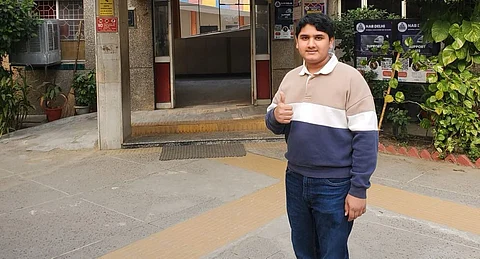

"I never thought I'd be able to do this," whispered a young boy as he typed his name for the first time — a simple act that filled the room with pride and possibility.
That moment has stayed with me ever since. My journey into assistive technology began with a fascination for keyboards and a drive to create change.
One day, I came across an advertisement for a Braille keyboard, and while I admired its design, I was shocked to learn it cost $7,000 USD. It struck me as deeply unfair that something so essential could be so inaccessible.
I remember speaking with a student at a school for the blind who told me he dreamed of becoming a writer. For him, typing each letter was a slow, painstaking process — one that often left him feeling defeated. Knowing that visually impaired individuals often face financial barriers, I felt compelled to act.
Driven by my interest in keyboards and a desire to help, I spent over a year researching solutions and connecting with experts in Braille education and assistive technology. Through this process, I discovered that combining 3D-printed Braille keys with refurbished or inexpensive keyboards could create a functional and affordable alternative. This approach reduced the keyboard's cost to just $10.
More importantly, it made typing more intuitive and efficient for visually impaired users, compared to the time-consuming process of text-to-speech systems.
I partnered with two non-profit blind schools in Delhi, where I conducted workshops to introduce the keyboards. Seeing the impact firsthand was incredibly rewarding.
Over 250 students, many from underprivileged backgrounds, gained access to a tool that allowed them to type faster and participate more confidently in their education. Where typing a simple sentence once took several minutes, students could now write full paragraphs in a fraction of the time.
Witnessing their excitement and independence reaffirmed the importance of making technology accessible to everyone.
To expand this impact, I founded Jdable, a non-profit dedicated to creating opportunities for the differently-abled. Our team of over 20 dedicated members has since launched several initiatives, including tactile learning kits with 3D-printed geometric shapes, maps, and tactile globes to support the education of visually impaired students.
We’re also working on projects like an autonomous wheelchair and a smart cane to improve mobility and independence.
Jdable has also hosted events aimed at raising awareness and fostering innovation in assistive technology. Our accessible technology hackathon and disability awareness campaigns have encouraged creative solutions and meaningful conversations about inclusivity.
I’ve been fortunate to receive some recognition for my efforts, including the Gold Presidential Volunteer Service Award and the Silver Service Award from Princeton Day School. I've also had the chance to participate in hackathons, where I won the University of Pennsylvania Class Competition (1st place), Best Hardware Hack at PantherHack 2023, and Best Social Hack at PantherHack 2024.
Additionally, I placed 3rd at HackBAC, earning a $500 prize, and was honored with the Outstanding Achievement by a Student award for my contributions to my school's stage crew at the 2024 Theatre Night Awards.
While these achievements are humbling, the real reward has been seeing how accessible technology can change lives. The patent for my Braille keyboard isn’t just a personal milestone — it represents a step toward creating a more inclusive world.
There’s still so much more to be done. Jdable's mission relies on collaboration, donations, and partnerships to continue building solutions for individuals with disabilities. Together, we can break down barriers and ensure that no one is left behind in the digital age
(Umang Sharma is a Class XI student of Princeton Day School. Views expressed are his own)
